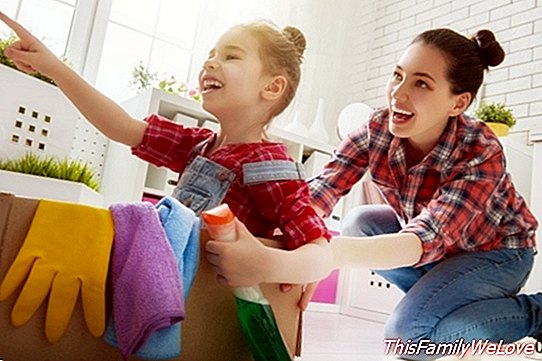The degrees of autonomy of children

Children are like "rubber", but sometimes we can not prevent them from falling, making mistakes, things go wrong ... What's more, before falling into overprotection it is necessary to put the means to avoid protecting them too. It is one thing to pamper them and another to not let them breathe with our care. The small blows and falls are part of the learning of the little ones, in addition to educating their strength.
If we are aware that up to now we have been overprotective with our son, then it was time to act. It is convenient that we know the degrees of children's autonomy, that is, what they can do by themselves according to their age and based on that let them do it, even if it costs us.
A good method to make him understand that he must be more independent and autonomous is starting to call the child by his name, without diminutives: that Luisito is Luis. You have to apply the same rule for objects, that is, nothing of "it's time to go to bed," but "to bed." He also has to call things by his name: he does not say "wow-wow", but "dog".
The degrees of autonomy of children
From 3 to 4 years old:
- Start using the fork to eat, eat alone without spilling the spoon and take the cup by the handle.
- You untie your shoes, you can undress and get dressed, but without buttoning.
- He is able to wash his hands and turn off the tap. You can also use the napkin correctly.
- Help pick up the toys.
- You can climb the stairs alternating feet.
- You can hang jackets and coats properly.
From 4 to 5 years old:
- Eat alone, with the fork, put on the shoe corresponding to each foot and know how to fasten clothes.
- He washes his face, brushes his teeth and combs his hair. Knows how to do your needs independently.
- You can collaborate on small homemade orders.
- Is able to take care of books and close doors and windows carefully.
- He knows how to throw the papers in the trash can.
From 5 to 6 years old:
- Start using the knife to accompany the fork. It behaves correctly on the table during the meal.
- He dresses himself and ties the laces. He still has trouble buckling his back buttons.
- It can adapt to the schedules.
- Wash the dirty instruments, such as brushes, toothbrushes, sponges, etc.
- Is able to cross obstacles and pick up clothes that fall to hang on the rack.
- Respects the objects of others, not using them without permission. Cover the bottles and jars containers.
Tips for children to gain autonomy
- It is advisable that when our son starts doing things on his own, let us praise much in everything that he does correctly. With what does not come to the first, we will have to have some patience and not constantly recriminate his faults.
- Especially at the beginning, not everything will be done perfectly and much less quickly. For that reason, it agrees that we give a certain margin and without altering to us. It is better that we get up 10 minutes before bed so that the child puts on his socks at his own pace to do it all.
- When we go to the park or other places Where the dangers are more evident, it is better to look askance at what you do and not show an exaggerated concern. The only thing we will achieve is to put fear and insecurity, which could turn him into a withdrawn child tomorrow.
- If at first we are afraid to use a knife or fork, we must not allow this to hinder their progress. It is better to buy a set of special cutlery than to continue cutting the steak until it is older.
- To get our son to "get out", we must allow it to acquire a certain freedom and responsibility. If we give him a small shower to take care of watering the plants, for example, surely he will be happy to carry out this assignment, even if he has to make many trips and we are behind him with the mop.
Teresa Pereda




